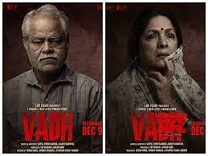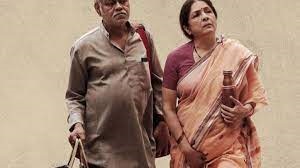|
|
||
|
Pro Tools
FILMFESTIVALS | 24/7 world wide coverageWelcome ! Enjoy the best of both worlds: Film & Festival News, exploring the best of the film festivals community. Launched in 1995, relentlessly connecting films to festivals, documenting and promoting festivals worldwide. Working on an upgrade soon. For collaboration, editorial contributions, or publicity, please send us an email here. User login |
Vadh, Review: Some people deserve to be killed
Vadh, Review: Some people deserve to be killed Taking the law into your own hands and getting away with crimes is becoming a recurring thread in Indian cinema. On the heels of one such film, Drishyam 2, comes another murder story, where the audiences’ sympathy lies with the protagonist, who, a law-abiding citizen otherwise, is pushed beyond his limits of tolerance, and ends up killing a man and disposing off his body. Whereas some schools of thought may ascribe to the theory that crime does not pay should be the message of any crime film, there is an increasing trend among Indian film-makers that conveys the message that some people deserve to be killed, and it is okay to dispose-off their bodies, cover-up the murder and deny the crime altogether. While this may cleanse the society of one vile villain, it sends a very dangerous signal. Taking the law into your own hands is a no-no, however vicious the man who embodies evil may be, even if the law machinery is corrupt or inefficient. Vadh is another film where the protagonist slays the dragon, like Saint George did, as recorded in an 11th century text. A lower middle class couple in their late 50s live a frugal life in Gwalior. Shambhunath Mishra is probably a retired school teacher who conducts classes at home, while Manju, his wife, is a devoted house-wife, perennially plagued by ill-health and given to frequent visits to the temple. Their only son, Diwakar, probably in his early to mid-20s, expresses a desire to go the USA for further studies, for which he needs Rupees ten lakh (1 million). With almost no savings, Mishra borrows money from the banks as well from a loan shark, with the understanding that his son will send money for the repayment. The son goes to the USA, marries an Indian woman there, has a baby and all but forgets that he has parents. On the rare occasion when Shambhunath reminds him, on Skype, that money needs to be repaid, he offers to send Rs. 10,000, but not without a volley of harsh words. Shambhunath closes his Skype account and deletes the son’s name from his phone. Running all his errands, Shambhunath does not buy anything on credit. But the bank and the loan shark, a man called Pandey, keep making their demands. One day, Pandey brings a girl over to Mishra’s house, has a few drinks and locks himself and the girl in the Mishras’ only spare room. This has a very strong impact on Mishra’s psyche. He reports the matter to the police, but finds them on the take from Pandey. Pandey is the scum of the earth, and one day, he comes to the Mishra home and threatens to evict him, unless he calls one of Mishra’s tuition students, 12 year-old Naina, pet-name Billi, to his house and allows him to have sex with her. This proves too much for the docile but ultra-sensitive Mishra, who decides to kill Pandey. That will save Naina as well as relieve him of his debt. While Pandey is waiting to enjoy his drink, Mishra grabs hold of a screwdriver, and… In the directors' chairs are Jaspal Singh Sandhu and Rajeev Barnwal, both first timers. Sandhu has been a producer (Angrej) while Barnwal a writer (Besharam). The two have collaborated on the script too. To their credit, the film does not bear any marks of dual stewardship. There are a few issues. It may have slipped by that Mishra was a teacher (most likely) and is now retired, conducting tuition classes at home. But what are their finances and how do they manage them is never showcased. It is not clarified what loan did Mishra take from the bank, and how much did he take from the loan shark, though it is said time and again that he took Rs. 10 lakh from the shark, when he needed Rs. 10 lakh. It is also mentioned that the requirement was for Rs. 25 lakh. So where did the bank money go? And what action did the bank take to recover its loan. In the second half, one is able to predict what Mishra will do to Pandey, for a protagonist can take only so much and no more. Mishra is able to erase all signs of his crime with uncomfortable ease and incredible good fortune. It requires great cunning to do what he does, and till he does it, we are given no signs that he is capable of such deeds. The track involving the magazine Manohar Kahaniyan (a real-life publication that carries murder mysteries in some detail, and is acknowledged in the beginning credit titles) seems contrived, though it is possible that persons like Mishra and the Police Sub-Inspector do read it. Nor enough to justify the scenes that bring the magazine to the fore. A similar ply was used in Drishyam 2. Vadh scores high on the characterisation. Each character is well delineated, right from the scooter rider to the flour-mill owner to the Sub-Inspector. And locations are carefully chosen, so as to blend with the people who populate them., and is helped by some high level performances. Influences of other films cannot be discounted, yet Vadh takes its own path, as if belonging to a genre. Is this format rapidly becoming a genre? The jury should be out there.
For Sanjay Mishra (the surname is uncanny), this could be one the best roles he has essayed. Wasted in inconsequential roles, here his expressions and eye movements are so well blended with the character of Shambhunath Mishra! As Manju, his wife, Neena Gupta is a natural, having been there done that. After some time, there arrives a villain who is menacing, with a veneer of being ultra-cool, and knowing his job. Vadh owes a lot to the actions of Saurabh Sachdeva, the Pandey in the cast. Manav Vij is well-cast as the corrupt Police Inspector. His physique is obviously that of a man who is strong and yet has enjoyed the good life, as the Inspector would have. Diwakar Kumar, as the son, Diwakar (name?!), gets show how ungrateful and uncaring he can bee, and he does so with élan. Also in the cast are Tanya Lal, Umesh Kaushik, Abhitosh Singh Rajput and Pranjal Pateriya. Music is by Gurcharan Singh, cinematography by Sapan Narula, film editing by Bharat S. Raawat, production design by Nadiri Khan and Tariq Umar Khan, costume design by Darshan Jalan and Manish Tiwari, makeup by Yashika Arora and Pratik Gupta. A 1 hour 50 minutes, the never sags or drags, and some makers who opt for much longer lengths could take a leaf out of this film. Once you accept the premise of the film, and you have no choice in the matter if you are a critic, then you must then weigh it on its merits. Actually, a critic can dismiss the film on the theme itself, and then there would be no review. Do such films influence society? A couple of days ago, a 73-year-old woman, owning a large flat in Mumbai, was killed by her son, apparently to get hold of the property, and her body was scattered over a mountainous terrain. God forbid somebody is inspired to go the way the protagonist did, both in Drishyam (1and 2) and Vadh. But only the State can take somebody’s life, and that to, in the most extenuating of circumstances. I am not dismissing the film because there is substantial material to review, besides the premise. So, judging on various other cinematic parameters, the film is worth watching, but strictly adult fare. Rating: *** Trailer: https://www.youtube.com/watch?v=O5EkZtIXb1Q 09.12.2022 | Siraj Syed's blog Cat. : Abhitosh Singh Rajput Bharat S. Raawat Darshan Jalan Diwakar Kumar Drishyam Drishyam 2 Gurcharan Singh Jaspal Singh Sandhu Manav Vij Manish Tiwari Manohar Kahaniyan Nadiri Khan Neena Guota Pranjal Pateriya Pratik Gupta Rajeev Barnwal Sanjay Mishra Sapan Narula Tanya Lal Tariq Umar Khan Umesh Kaushik Yashika Arora Independent FILM
|
LinksThe Bulletin Board > The Bulletin Board Blog Following News Interview with EFM (Berlin) Director
Interview with IFTA Chairman (AFM)
Interview with Cannes Marche du Film Director
Filmfestivals.com dailies live coverage from > Live from India
Useful links for the indies: > Big files transfer
+ SUBSCRIBE to the weekly Newsletter Deals+ Special offers and discounts from filmfestivals.com Selected fun offers
> Bonus Casino
User imagesAbout Siraj Syed Syed Siraj Syed Siraj (Siraj Associates) Siraj Syed is a film-critic since 1970 and a Former President of the Freelance Film Journalists' Combine of India.He is the India Correspondent of FilmFestivals.com and a member of FIPRESCI, the international Federation of Film Critics, Munich, GermanySiraj Syed has contributed over 1,015 articles on cinema, international film festivals, conventions, exhibitions, etc., most recently, at IFFI (Goa), MIFF (Mumbai), MFF/MAMI (Mumbai) and CommunicAsia (Singapore). He often edits film festival daily bulletins.He is also an actor and a dubbing artiste. Further, he has been teaching media, acting and dubbing at over 30 institutes in India and Singapore, since 1984.View my profile Send me a message The EditorUser contributions |





























